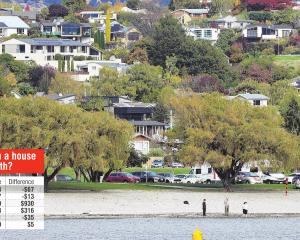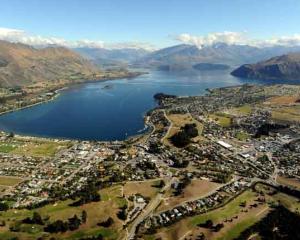
On the afternoon of Tuesday, March 3, Virgin Australia Airlines captain and pilot Terry Hetherington taxied a Boeing 737 aircraft to its designated gate at Auckland International Airport.
He had just flown to Melbourne and back, and it was his last day of work before going on annual leave.
Mr Hetherington had flown with the crew many times on previous occasions but as he stepped off the aircraft he had no idea it would be for the last time.
"I was due to fly to northern Italy on March 6 to go ski touring with my brother and a group of friends.
"We were monitoring the situation fairly closely and that night we actually decided not to go, even though Italy was not in lockdown and flights were still going on normally."
Covid-19 kept evolving and on Sunday, March 22, Mr Hetherington’s airline manager rang him to discuss future work options.
On Monday, March 23, a representative from the New Zealand Air Line Pilots’ Association contacted Mr Hetherington to say the union had agreed with the airline for all pilots to work 50/50 or part-time.
Two days later, Mr Hetherington was sitting down to lunch when he received an email from Virgin Australia informing him it was shutting down its New Zealand organisation completely — he would be made redundant effective from April 3.
"I was in shock, everyone was in shock. It is one of those things that takes a lot to process."
March 25 was also the day New Zealand went into Alert Level 4 lockdown.
"On the same day as the country was going into lockdown I lost my income and my career. That was how it felt because I am 52 years old and the opportunities going forward as you get older in aviation get harder over the age of 50.

"It wasn’t as if I could pop down the street, have a few beers with my mates and cry into my beer.
"We sat at home like all families did and worked through it step by step — what do we think, what are the outcomes, how are we going to manage?"
Until that day, Mr Hetherington had been living the dream.
Although he had always wanted a career in aviation, he had taken a circuitous route, training first as a chef at the Queenstown Hyatt Hotel before travelling around Europe and North America for six years working as a chef.
He met his New Zealand-born future wife Carin in Austria, and convinced her to return with him to Wanaka, where he had spent his summers while growing up in Dunedin.
From 1993 to 2000, Mr Hetherington worked as a member of the ski patrol at Treble Cone in winter, and became manager of the snow safety programme.
In summer he owned and operated a property maintenance business.
Mr Hetherington obtained his commercial pilot’s licence in 2000. His first aviation job was flying a Cesna to and from Milford Sound and throughout the lower South Island.
He moved to Brisbane to further his career, flying the Combi, a heavy passenger and freight turboprop aircraft, all over Australia, Papua New Guinea and the Solomon Islands.

‘‘It was all interesting flying because a lot of it was remote and froman aviation point of view the thunderstorms you get in Australia are savage. You don’t get storms of that intensity in New Zealand and you don’t get that extreme heat,’’ Mr Hetherington said.
In 2011 an opportunity came up to fly jets with Virgin Australia and he ‘‘jumped at it’’.
‘‘It was on the condition that I turned up with a 737 type rating with Boeing and once Ihad that qualification Virgin would put me through their own training system.’’
He paid $45,000 for a six-week course of simulated and computer-based training.
"I remember my first time sitting in the right hand seat of a real Boeing 737. I had done 50 or 60 hours in a simulator but this was the first time in a real plane and with 180 passengers."
Mr Hetherington began flying short-haul international flights for Virgin Australia out of Auckland to 16 different destinations.
‘‘Every day was different — different destinations, different weather, different people. It was wonderful in that sense.
‘‘Working with the same cabin crew for five days, staying at the same hotel and going out for meals together — over nine years these people became your second family,’’ he said.
‘‘What I enjoyed most about aviation was actually the really interesting people you worked with.
‘‘You have to imagine being in a cockpit with just two of you, each safety belted into your seat, neither of you can leave, and you are going to spend the next 12 hours together each day for the next five days.
‘‘You get to know each other pretty well. By the end of it you know their life story and they know yours — these are all interesting intelligent people and even though you may only fly with him or her for five days every six months, when you bump into them you have a real conversation.’’
One of the challenges of dealing with Covid-19 was not having the opportunity to say goodbye to his colleagues, Mr Hetherington said.
‘‘You have lost a lifestyle and these people were associated with that.’’
A private Facebook page has been set up for New Zealand Virgin Airline employees to communicate.
‘‘I might be the only person based in Wanaka from Virgin but I have a lot of colleagues who have holiday homes here, so I have caught up with them for a coffee and that network still goes on because these are people you know really well.
‘‘Some of them experienced this when Ansett NZ folded or Ansett Australia collapsed. One of our guys who retired because of Covid had this happen five times in his career.
‘‘Airlines can go bust, so you have to be a bit resilient inthis industry to deal with that because it is cyclic.’’
Mr Hetherington was now ‘‘re-retraining’’ to be a flight instructor, flying two days a week for Milford Sound flights, and was optimistic about the future of aviation.
‘‘Once they get a vaccine or we learn to live with Covid-19 aviation will take off, there is no doubt in my mind.
‘‘There will be opportunities to fly jets again but they will probably be in China or the Middle East and there is also a lot happening in the private jet world with people who can’t fly commercially or don’t want to fly around commercially because of Covid.
‘‘I believe we are in a holding pattern for two or three years but the wonderful thing about aviation is there are a lot of different paths you can go down in the meantime.’’












